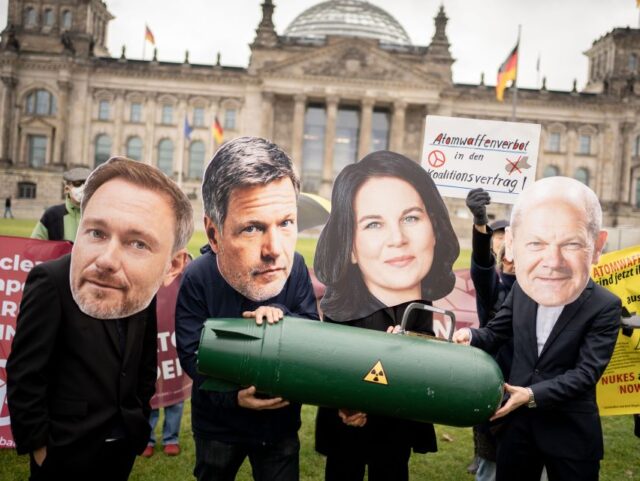The European Union, already racing towards becoming a federal superstate in its own right, may need to develop its own nuclear deterrent “on the way to a European army” a top German MEP says.
The leader of German governing party in the European Parliament the Social Democrats (SPD) Katarina Barley MEP responds to Russian aggression in the east of Europe and clear signals from President Trump that Europe needs to do more to protect itself in line with NATO treaty requirements by suggesting the time may have come for nuclear weapons.
Speaking to the German liberal-centrist-positioned newspaper Der Tagesspiegel Barley said the certainty of the “U.S. nuclear umbrella” for Europe was waning and consequently nuclear weapons for the European Union “could also become an issue on the way to a European army.”
Given what she said was Russian President Vladimir Putin’s interest in Poland and Lithuania, “it shows how vigilant we must be”, she said, remarking if the U.S. was overcome by war fatigue in Ukraine and stopped supplying weapons to Kyiv then Europe would have to step in.
The EU had two nuclear-armed states before Brexit, when the United Kingdom withdrew from the continental power bloc, leaving just France with its 290 warheads. In addition, European states Belgium, Germany, Italy, and the Netherlands host and train with U.S. nuclear weapons through the NATO nuclear sharing programme. Their own aircraft can carry and launch American nuclear weapons, but only with American permission, making the system an extension of the U.S. programme through NATO rather than an independent deterrent.
Extending nuclear weapons to more states is fraught with legal difficulty, not least due to the Treaty on the Non-Proliferation of Nuclear Weapons of 1968 which absolutely forbids this. Indeed, several nations condemned Russia for deploying parts of its nuclear arsenal to allied state Belarus last year, saying this breached the Treaty, making Europe attempting to do the same thing questionable in practice.
Russia argued that by giving Belarus the ability to launch nuclear weapons from its aircraft on its behalf they were merely doing the same thing the U.S. had by integrating its own bombs into the German air force, for instance. Yet the U.S. nuclear sharing programme predates the Non-Proliferation Treaty by years, and consequently was ‘grandfathered in’ at the time of signing.
That is to say nothing of domestic objections. Germany, for instance, is now so anti-nuclear it has shut down its fleet of nuclear power plants in the middle of an energy crisis, as the political imperative of unloading clean atomic energy was greater than ensuring national demand could be met in the face of lost imported gas from the Russian Federation.
Barley’s reference to “a European army” refers to decades of dreaming by Eurofederalists — the label applied to European politicians who work towards turning the European Union into a federal superstate, its individual member nations sublimated into regions of the greater whole — that the EU would eventually command a single continental army, navy and air force. Critics cite the undermining of national sovereignty and the inefficiency of adding yet another command structure where NATO already works well, and the question of the United Kingdom being bounced into such a force was one of many arguments that drove the Brexit vote in 2016.

COMMENTS
Please let us know if you're having issues with commenting.